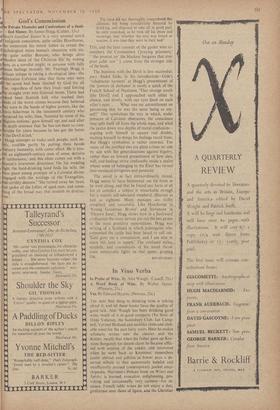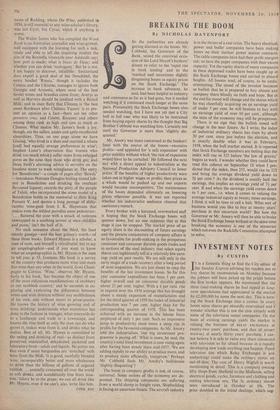In ,Vino Verba
Vim By Edward Hyams. (Newnes, 21s.) Tifi: next best thing to drinking wine is talking . about it, and all these books have the quality of good talk. Alec Waugh has been drinking good wine,. much of it in good company (Ye Sette of Odde Volumes, the Saintsbury Club, Ian Camp- bell, Vyvyan Holland and suchlike clubs and club- able men) for the past forty years. Here he makes scholarly sorties into the classics and the Koran; recalls that when his father gave up Key- stone Burgundy for decent claret he became afflic- ted with eczema of the ankles, and recovered when he went back to Keystone; remembers jaunts abrbad and jollities at home; pays a de- served tribute to that enormously helpful and insidiciently praised contemporary pocket ency- Marrison's Pelican book on Wines and Spirits; is learned, evocative, enlightening, pro- voking and occasionally very careless—for in- stance, French table wines do not enjoy a duty . preference over those of Spain, and the Christian , 11,191.11110NIMPOMPPNIUMMIIMMIIIIPMeril
name of Redding, whose On Wine, published in 1854, is still essential to any wine-scholar's library, was not Cyril, but Cyrus, which if anything is worse.
The Walter James who has compiled the Word Book is an Australian journalist and wine-grower, well equipped with the learning for such a task, ready and able to tell the inquiring student the size of the Reynella vineyards near Adelaide, say; how port is made; what is Mane de blanc; and whether you can drink 'mahogany.' But he is not, I am happy to discover, infallible : Switzerland does export a good deal of her Neuchatel; the entry headed 'Russia,' though it includes the Crimea and the Ukraine, manages to ignore both Georgia and Armenia, where most of the best Soviet wines and brandies come from; Averys as well as Harveys should be credited with a Bristol Milk; and to state flatly that Climens is 'the best sweet Bordeaux after Château Yquem' is to pre- sent an opinion as a fact—there are ten other premiers crus, and Coutet, Rieussec' and others among them rank as high and cost as much as Climens. What makes Mr. James's book a joy, though, are the sallies, asides and aptly-recollected absurdities. Thus, on one page alone we have Gissink, 'who lived in a slum and married a whore [and] had equally strange preferences in wine'; Stephen Lister's observation that women who drink too much whisky suffer more from enlarged pores on the nose than those who drink gin; and Dean Swift's alarming advice to servants on the handiest water to wash wineglasses in. The entry for 'Benedictine'—a couple of pages after 'Bawdy' —introduces Norman Douglas boiling tinned lob- ster in Benedictine and drinking the resultant flavoured liqueur; records the piety of the people of Tahiti, who incorporated the stone model of a Benedictine bottle in the memorial to their King Pomare V, and quotes a long passage of dithy- rambic wine-gush from J. K. Huysmans that makes even the wildest parodies seem pedestrian : `. . . flattered the nose with a smack of rankness enwrapped in a soothing savour at once childlike and pious,' isn't the half of it,
No such nonsense about the third, the least merely gossipy—and the best guinea's worth—of these three books. Edward Hyams is a scholar, a man of taste, and himself a viticulturist, not to say an ampelographist—and if you want to know what an ampelographist is, Mr. Hyams is the man to tell you; p. 53, footnote. His book is a survey of the country that produces more wine and more fine wine than any other in the world, from Cham- pagne to Corsica. 'Wine,' observes Mr. Hyams, early in his book, 'has become the object of one of the most ridiculous manifestations of snobbery in our snobbish country,' and he succeeds in ex? ploring and explaining the differences between wines and wine districts without any snobbishness of his own, and without resort to prose-poems. He knows the history of wine growing and of wine drinking; understands what economics has done to the fashion in vintages, what•vineyards do to a landscape and trade to a townscape, and knows the vine itself as only the man can do who grows it, makes wine from it, and drinks what he makes. Best of all, Mr. Hyams is committed to the eating and drinking of real—as distinct from preserved, mummified, dehydrated, packeted and laboratory-bred—solids and liquids. He points out that even if some burgundies are 'stretched' with wine from the Midi, 'it is good, carefully blended wine, incomparably better and more wholesome to drink than the billions of gallons of sugared rubbish ... annually consumed all over the world as soft drinks, and scandalously free from taxa- tion.' Glory be to the grape; we can all drink like Mr. Hyams, even if we can't, alas, write like him.
CYRIL RAY







































































 Previous page
Previous page